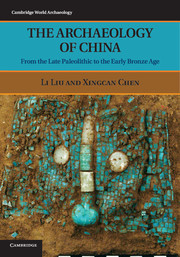Book contents
- Frontmatter
- Contents
- Illustrations
- Tables
- Preface
- Chapter 1 Chinese archaeology: Past, present, and future
- Chapter 2 Environment and ecology
- Chapter 3 Foragers and collectors in the Pleistocene-Holocene transition (24,000–9000 cal. BP)
- Chapter 4 Domestication of plants and animals
- Chapter 5 Neolithization: Sedentism and food production in the early Neolithic (7000–5000 BC)
- Chapter 6 Emergence of social inequality – The middle Neolithic (5000–3000 BC)
- Chapter 7 Rise and fall of early complex societies: The late neolithic (3000–2000 BC)
- Chapter 8 Formation of early states in the Central Plain: Erlitou and Erligang (1900/1800–1250 BC)
- Chapter 9 Bronze cultures of the northern frontiers and beyond during the early second millennium BC
- Chapter 10 The late shang dynasty and its neighbors (1250–1046 BC)
- Chapter 11 Chinese civilization in comparative perspective
- Appendix Horse bones in faunal assemblages from Neolithic and early Bronze Age sites in north China
- Glossary
- References
- Index
Chapter 8 - Formation of early states in the Central Plain: Erlitou and Erligang (1900/1800–1250 BC)
Published online by Cambridge University Press: 05 June 2012
- Frontmatter
- Contents
- Illustrations
- Tables
- Preface
- Chapter 1 Chinese archaeology: Past, present, and future
- Chapter 2 Environment and ecology
- Chapter 3 Foragers and collectors in the Pleistocene-Holocene transition (24,000–9000 cal. BP)
- Chapter 4 Domestication of plants and animals
- Chapter 5 Neolithization: Sedentism and food production in the early Neolithic (7000–5000 BC)
- Chapter 6 Emergence of social inequality – The middle Neolithic (5000–3000 BC)
- Chapter 7 Rise and fall of early complex societies: The late neolithic (3000–2000 BC)
- Chapter 8 Formation of early states in the Central Plain: Erlitou and Erligang (1900/1800–1250 BC)
- Chapter 9 Bronze cultures of the northern frontiers and beyond during the early second millennium BC
- Chapter 10 The late shang dynasty and its neighbors (1250–1046 BC)
- Chapter 11 Chinese civilization in comparative perspective
- Appendix Horse bones in faunal assemblages from Neolithic and early Bronze Age sites in north China
- Glossary
- References
- Index
Summary
The great affairs of a state are sacrifices [both to ancestors] and [in] war. At sacrifices [in the ancestral temple], [the officers] receive the roasted flesh; in war they receive that [raw flesh] offered at the altar of the land: – these are the great ceremonies in worshipping the Spirits.
Chapter, “Duke Cheng's Thirteenth Year [577 BC],” in Zuozhuan (compiled within 475–221 BC); translated by James Legge, modified国之大事, 在祀与戎, 祀有执膰, 戎有受脤, 神之大节也。 《左传》 成公十三年
China is one of a few regions in the world where the earliest state-level civilizations developed, independently of determining external influence. Questions about the origins of the state may be approached both historically and archaeologically. China has a long tradition of recording historical events, a legacy that provides rich quantities of information concerning its early dynasties and offers important sources for study of the origins of dynastic civilization. The archaeological record also reveals abundant data for investigation of social, political, and technological changes in locales wherein these early dynasties developed, and excavations have primarily focused on large sites that presumably correspond to dynastic capital cities. Therefore, the origins of early states in China involve four intertwined issues: state formation, development of urbanism, emergence of civilization, and beginning of dynastic history.
- Type
- Chapter
- Information
- The Archaeology of ChinaFrom the Late Paleolithic to the Early Bronze Age, pp. 253 - 296Publisher: Cambridge University PressPrint publication year: 2012



